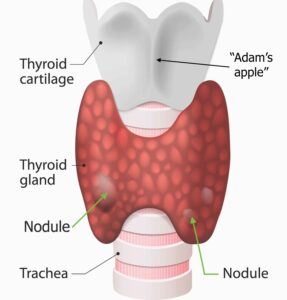
Thyroid nodules are common growths that develop in the thyroid gland, which is located in the neck and produces hormones that regulate metabolism. While most thyroid nodules are benign, some can be cancerous, making it important to understand the symptoms, diagnosis, and treatment options available.
Symptoms
Many thyroid nodules do not cause symptoms and are often discovered during a routine physical exam or imaging test. However, some nodules can grow large enough to cause noticeable symptoms, such as:
- A lump or swelling in the neck
- Difficulty breathing or swallowing
- Neck pressure
- Enlarged thyroid gland (known as a goitre)
Diagnosis
To diagnose a thyroid nodule, your doctor will perform a physical exam and may order imaging tests such as an ultrasound or CT. A fine needle aspiration (FNA) biopsy may be performed to collect a sample of the nodule for further testing.
The Bethesda System for Reporting Thyroid Cytopathology is a standardized classification system that is used to interpret and report the results of thyroid FNA biopsies. The system categorizes thyroid FNA biopsy results into six diagnostic categories based on the type and degree of abnormality detected in the cells.
Treatment
The treatment for thyroid nodules depends on several factors, including the size and type of nodule, the patient’s age and overall health, and whether the nodule is causing symptoms or has the potential to be cancerous.
In some cases, watchful waiting may be recommended for small, noncancerous nodules that are not causing symptoms. For larger nodules or those causing symptoms, surgical removal may be necessary.
Thyroidectomy is a surgical procedure that involves removing all or part of the thyroid gland. In cases where cancer is present, radioactive iodine therapy may be used in addition to surgery to destroy any remaining cancerous cells.
Conclusion
Thyroid nodules are a common condition that can cause anxiety and uncertainty, but most nodules are benign and do not require treatment. If you experience any symptoms or have concerns about thyroid nodules, it is important to talk to your doctor about your options for diagnosis and treatment. With proper diagnosis and management, most people with thyroid nodules can expect a good outcome.